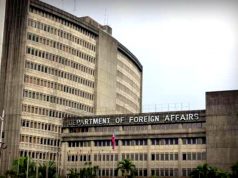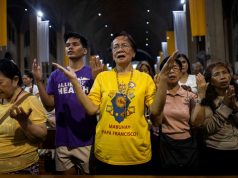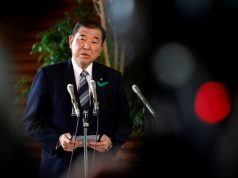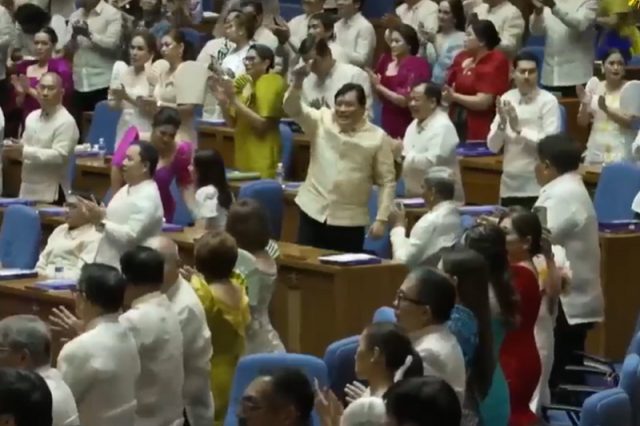
President Ferdinand Marcos Jr.’s mention of the West Philippine Sea and the ban on Philippine Offshore Gaming Operators (POGO) in his third State of the Nation Address drew cheers at the Batasang Pambasa Complex in Quezon City.
The chief executive on Monday updated Filipinos on the country’s conditions and how his administration has been faring in his third year as its leader.
Marcos mentioned the two most anticipated topics after more than an hour into his speech, with some Pinoys calling it to attention before he talked about the issues.
On West Philippine Sea
For the West Philippine Sea, the president said that it is not a figment of our imagination and stressed that “it is ours.”
“In our international relations, we have faced challenges to our territorial sovereignty. And we will assert our rights and interests in the same fare and pacific way that we have always done,” he said, earning applause from the audience.
Marcos added that “proper diplomatic channels and mechanisms” would remain the “only acceptable means of settling disputes.”
“Peace and community building will always be our clarion call,” he continued.
The president then mentioned that the Philippines “continuously” tries to find ways to de-escalate tensions in contested areas with its counterparts without compromising its positions and principles.
“The Philippines cannot yield. The Philippines cannot waver,” he said.
“Ang West Philippine Sea ay hindi isang kathang-isip natin lamang. Ito ay atin!” Marcos exclaimed.
READ: Philippines ‘cannot yield’ its West Philippine Sea position, Marcos says
He was about to continue his speech but the Batasang Pambansa Complex erupted into cheers, with some attendees standing from their seats. This went on for a moment.
“At ito ay mananatiling atin hangga’t nag-aalab ang diwa ng ating mahal na bansang Pilipinas,” he added.
The cheers continued once more.
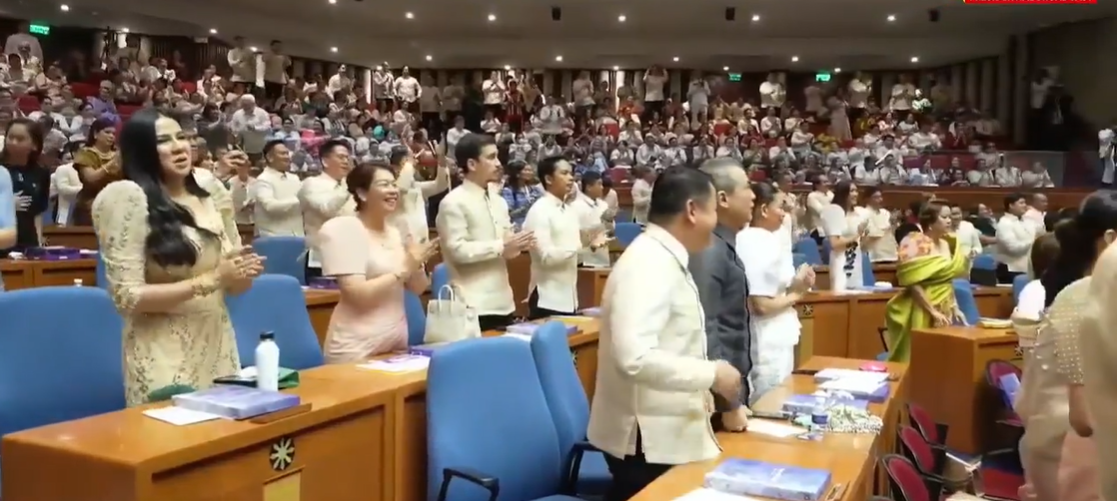
Praises were also seen on social media, where Filipinos lauded the president for his declaration.
“AMEN, PRESIDENT MARCOS, ‘WPS [West Philippine Sea] AY HINDI KATHANG ISIP LAMANG,'” an online user said.
“In fairness, ang lakas ng SONA ni Marcos this year. May mga kathang isip na promises pero ‘yung passion [niya] nung sinabi nya na ang WPS ay atin and ‘yung issue ng POGO. Wow!” another Pinoy commented.
Standing ovation for President Marcos as he said the Philippines will not and cannot yield nor waver in defending its maritime claims in the West Philippine Sea, insisting that those waters will continue to be Filipino as long as the spirit of the nation continues to burn.
Very… pic.twitter.com/I4LkVK0xEp
— Ivan 🇵🇭🇻🇦 (@IvanAtHome) July 22, 2024
While Marcos was lauded for his remarks, some sought for more concrete plans from his administration as Chinese encroachment in the maritime areas continued to intensify.
“Nasaan ang plano? Paano matutulungan ang mga mangingisdang patuloy na tinataboy ng CCG [Chinese Coast Guards]? Anong plano sa mga nasisirang coral reefs sa WPS [West Philippine Sea]? Hanggang ‘hindi kathang-isip ang West Philippine Sea’ lang?” a Filipino commented.
“Ganun lang, puro statement about West Philippine Sea? ANO BAGONG GAGAWIN [OR] PLANO MO, Mr. President Ferdinand Marcos Jr., para wala na kahit isang pulga makuha ang China sa #WPS? Huwag puro lang salita!” another X user wrote.
Last June, Chinese Coast Guard personnel rammed, towed, and boarded Philippine Navy boats on its resupply mission to BRP Sierra Madre stationed at the Ayungin Shoal (also Second Thomas Shoal).
The Chinese also “looted” firearms from the Filipinos despite them not being used in the resupply mission.
The incident had caused one Pinoy navy personnel to lose his finger.
A month later, CCG’s “monster ship” was spotted near Escoda Shoal (also Sabina Shoal), which is just some 75 nautical miles from the Palawan province.
Marcos previously said he was aware of the need for the Philippines to go beyond filing diplomatic protests to address China’s aggressive maritime actions.
China has been claiming almost the entire South China Sea, parts of which include the West Philippine Sea or WPS.
WPS refers to the maritime areas along the western side of the Philippine archipelago within the country’s 200-nautical-mile exclusive economic zone (EEZ).
On POGOs
Apart from the West Philippine Sea, Marcos also earned widespread applause in his third SONA for declaring the ban on POGOs, which proliferated during the previous administration.
READ: Marcos orders closure of POGOs
“At ngayon po, naririnig po namin ang malakas na sigaw ng tayong bayan laban sa mga POGO,” the chief executive said.
“Disguising as legitimate entities, their operations have ventured into illicit areas furthest from gaming, such as financial scamming, money laundering, prostitution, human trafficking, kidnapping, brutal torture — even murder. The grave abuse and disrespect to our system of laws must stop,” he added.
“Kailangan nang itigil ang panggulo nito sa ating lipunan at paglalapastangan sa ating bansa!” Marcos said.
The hall erupted into cheers and applause, with some attendees giving the president a standing ovation for his remarks.
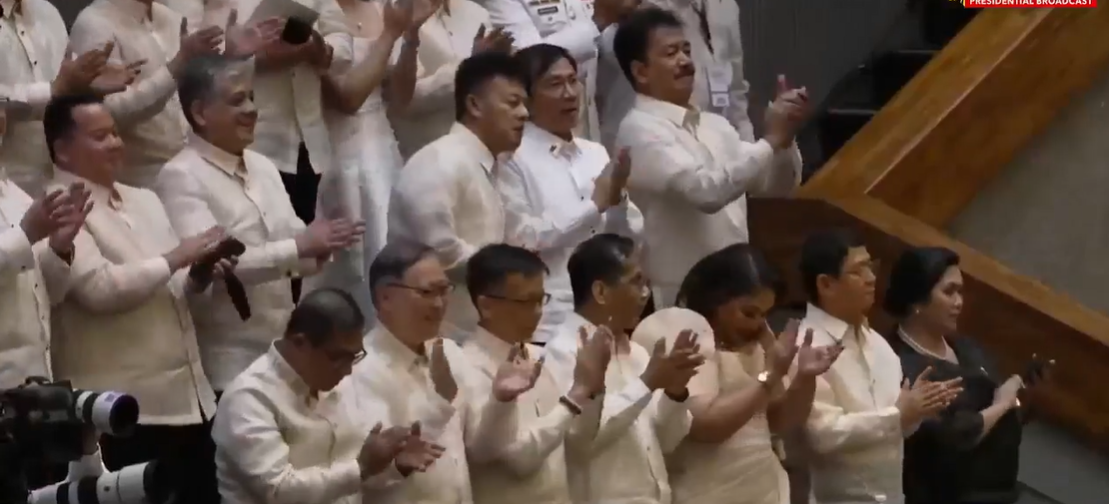
Rep. Richard Gomez (Leyte, Fourth District) was seen raising his fist while clapping.
“Effective today, all POGOs are banned,” Marcos continued.
The rounds of applause intensified, with some attendees exclaiming words such as “Yeah!”
“I hereby instruct PAGCOR to wind down and cease the operations of POGOs by the end of the year,” the president said.
PAGCOR refers to the Philippine Amusement and Gaming Corporation, which regulates gaming establishments.
POGOs came under intense scrutiny, especially after suspended Bamban, Tarlac Mayor Guo Hua Ping (also known as Alice Guo) was accused of allegedly enabling its illegal operations in her town.
A Senate probe also revealed that Guo had stolen identities for POGO. Lawmakers likewise scrutinized her citizenship and personal background.
READ: More questions raised after NBI doc bares another Alice Guo with same birthday | ‘Paano nangyari ito?’: Further probe into Alice Guo’s confirmed identity sought
The government started regulating POGOs in 2016 under the Duterte administration.
They were initially touted as a source of revenue but have since been associated with illegal activities such as scams, torture, and human trafficking.
The Department of Finance said that the country loses over P99.5 billion annually due to its operations.






